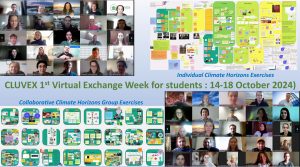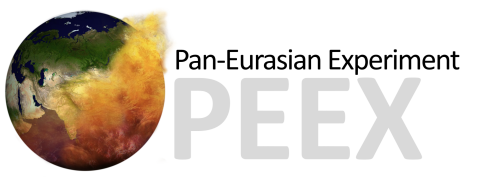Project Description

The 1st Virtual Exchange (VE) Week took place online 14-18 October 2024. More than 400 students had registered on DigiCampus for the first CLUVEX Virtual Exchange week. Out of all registered students, more than 200 students actively participated in the whole week’s program. The work was done online (3 hour per day). More than 200 participants attended event starting Monday, 18 Oct. Participants from Armenia, Ukraine, Finland, Denmark (as main members of the CLUVEX consortium) accounted for 84% as well as students from other countries (16%) attended this one-week online training. In brief, this 5-day work online allowed participants to listen short lectures on climate related topics, learn and practice with web-based tools for visualisation, analysis and interpretation of climate related data, work online as a group/team on Individual and Collaborative “Climate Horizon” exercises, participate in discussions, etc. Note, during VE Week, the DigiCampus (as educational platform), Zoom (as communication platform), and Miro (as collaborative platform) was actively used by the participants. Many issues related to using zoom communication platform were supported by Mikko Kulmala (Finland), and to using DigiCampus educational platform – by Aleksi Vauhkonen (Finland).
The VE Week started with welcome words to participants, introductory information about CLUVEX project and about individual and collaborative Climate Horizon exercises for students (Hanna Lappalainen, Laura Riuttanen, Julia Karhumaa, Finland). Each day information about exercises was repeated (by Julia Karhumaa, Finland) for participants to keep . On the first day, all students/ attendees were divided into small groups (1 moderator + up to 10 students in each group) and assigned to own break-out-rooms in zoom. Communication in these separate rooms started by introduction around-the-table and sharing pre-task (outcomes of home-work-assignment required to be done before the VE Week).
During 14-15 Oct, students listen a series of lectures “Navigating Planetary Boundaries: Blueprint for a Sustainable Future” (Inna Khomenko, Ukraine); “Climate Change, Disasters, Carbon Neutrality and UN SDGs” (Alexander Baklanov, Denmark); “Climate Change Impact on Water Resources” (Sergiy Snizhko, Ukraine); “Impacts of Climate Change and Future Outlook” (Hasmik Movsesyan, Armenia); “Artistic Research and Critical Thinking at the Intersection of Art, Science and Society” (Yvonne Billimore/ Piritta Puhto, Finland); and “Towards Sustainable Futures: Pedagogy of Concrete Utopias” (Antti Rajala, Finland).
During 15-17 Oct, students learned about web-based tools for climate-related data visualisation, analysis and interpretation, as well as they practiced with these tools extracting needed information for individual and collaborative (group) exercises. Tools were introduced and demonstrated at start of each day, and then, students with moderators continued working online in their groups. After introducing and demonstrating (Alexander Mahura, Finland) the ERA-5 Past Climate Explore tool (https://era5.lobelia.earth) as Tool for Environment and Data Visualization | Mapping Past & Present | the students continued their work in groups on individual Climate Horizon exercise. After introducing and demonstrating (Stefan Fronzek, SYKE, Finland) the SSPathways tool (https://data.worldbank.org/indicator & https://tntcat.iiasa.ac.at/SspDb) as Tool for Socio-Economic Drivers of Climate Change | Mapping Past & Drafting Future | the students continued their work in groups on individual Climate Horizon exercises as well started discussions on collaborative Climate Horizon exercise. After introducing and demonstrating (Risto Makkonen, Finland) the IPCC Atlas tool (https://interactive-atlas.ipcc.ch) as Tool for Climate Scenarios | Mapping Future | the students continued their work in groups on finalisation of their individual Climate Horizon exercises as well as started their work on collaborative Climate Horizon exercise.
On 18 Oct, on the last day of the training, all students and moderators again joined their groups, continue finalisation of their work and shared their individual Climate Horizons exercises with members of their groups, continued discussions and preparation of their collaborative Climate Horizons (using Miro-tool). Then, all these collaborative exercises were demonstrated for all participants. At the end, questionnaires with feedback about VE Week for students and for moderators were distributed.
Students, interested to obtain 1 ECTS credit were required to prepare individual summary reports and submit in the DigiCampus area for evaluation and approval. Moderators, interested to obtain 3 ECTS credits (as they had already 5 CLUVEX online trainings for moderators during May-Sep 2024) were also required to prepare moderator’s summary reports and submit in the DigiCampus area for evaluation and approval.
Several pool questions in zoom showed interesting results. On a poll question “What do you think is the biggest challenge behind climate change?” the participants answered (with a single choice) as follows: greed and selfishness (26%), political system (22%), dirty industries (18%), overpopulation (16%), consumerism (15%), and other (3%). On a poll question “Who do you think should solve climate change?” the participants answered (with multiple choices) as follows: politicians (77%), scientists (68%), entrepreneurs (44%), students (40%), and celebrity (20%). On a poll question “What has been the most rewarding part of CLUVEX week?” the participants answered (with a single choice) as follows: getting international experience (30%), working with different tools (28%), new ideas and perspectives (20%), learning about climate change (12%), meeting other students (7%), and nice polls in the morning (3%.)
The next, 2nd VE Week will take place in Spring 2025.
You are welcome to distribute information among your colleagues and students.
Follow information in news on the CLUVEX website (https://www.atm.helsinki.fi/cluvex).
See participants in zoom during the 1st day of the VE Week.
See list of Collaborative Climate Horizons exercises (by groups).
See Miro-view with Collaborative Climate Horizon exercises (by groups).
Text by: Hanna Lappalainen, Laura Riuttanen, Julia Karhumaa, Aleksi Vauhkonen, Mikko Kulmala, Alexander Mahura, Univ of Helsinki CLUVEX team
